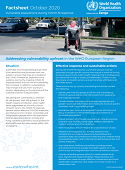Factsheet - Vulnerable populations during COVID-19 response - Addressing vulnerability upfront in the WHO European Region (October 2020)

Download
Challenges and solutions
- Where data are limited, inadequate or not available on vulnerable groups and there are blind spots in the routine surveillance mechanisms, collection of “lived experience evidence” is equally important to inform actions.
- Marginalized groups’ difficulties in accessing health care in normal times has been exacerbated during COVID-19; therefore, address the needs of vulnerable and marginalized groups upfront in the response as a priority.
- The lack of outreach to these groups because of restrictions or closure of community-based health and support services due to COVID-19 need to be minimized.
- Predicting and quantifying the risks of becoming newly vulnerable is difficult. However, evidence on this is accumulating from the experience of the first wave of COVID-19.



